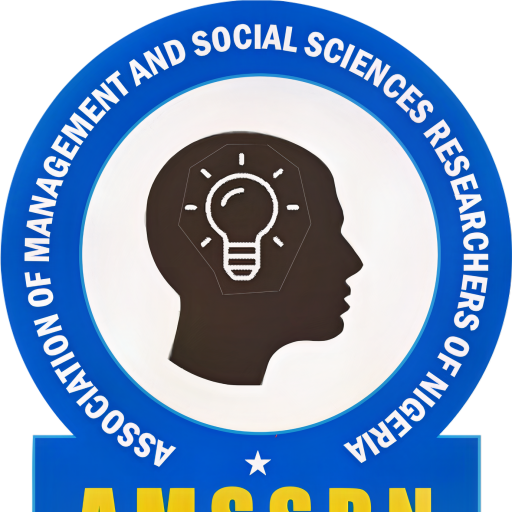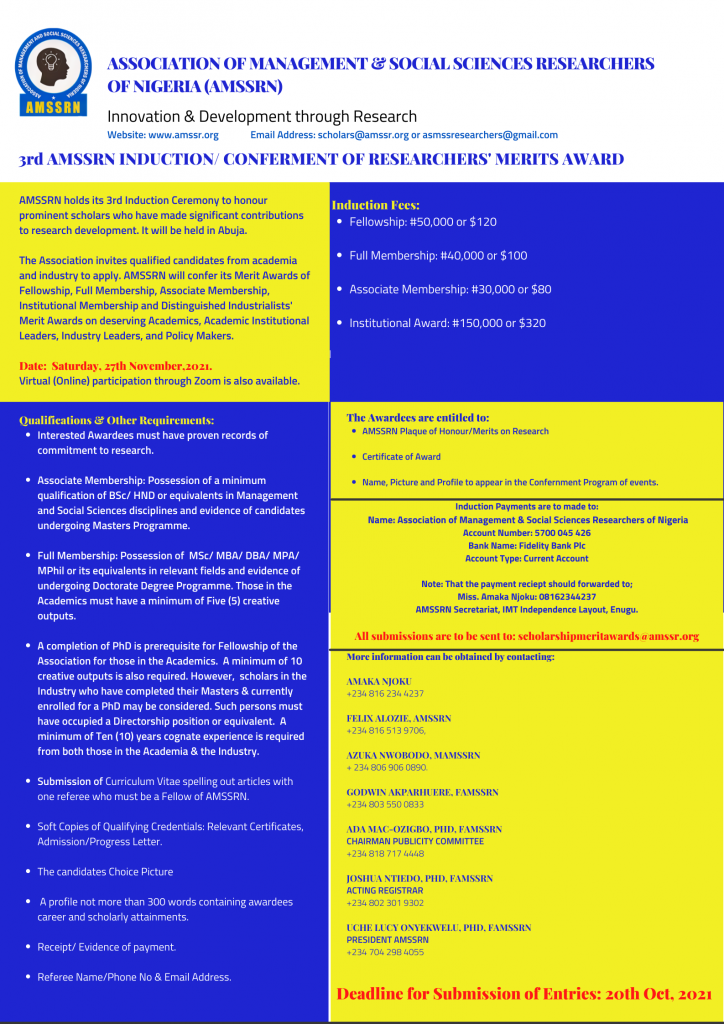By Godwin O. Akparhuere, PhD, FAMSSRN & Ikechukwu Ibekwe, PhD
A Position Paper Submitted to the Association of Management and Social Sciences Researchers of Nigeria, AMSSRN
Introduction
Examination malpractice remains one of the most persistent threats to the integrity and quality of education in Nigeria. It not only undermines academic standards but also erodes societal values, weakens institutional credibility, and stunts national development. This position paper takes a firm stand against examination malpractice, advocating for systemic reforms and stakeholder responsibility to address this endemic issue.
Examination malpractice in Nigeria dates back several decades but has intensified in frequency, scale, and sophistication in recent years. It encompasses a range of unethical practices such as impersonation, leakage of examination questions, bribery, collusion between students and examiners, and the use of unauthorized materials.
Reports from the West African Examinations Council (WAEC) and the Joint Admissions and Matriculation Board (JAMB) consistently highlight thousands of cases of malpractice annually. This disturbing trend not only questions the reliability of educational assessments but also signals a deeper moral and systemic crisis.
Triggers of Examination Malpractice
Systemic Weaknesses:
InExamination Malpractice in Nigeria Educational System: Challenges & Strategic Managementadequate supervision, poor enforcement of examination protocols, and lack of consequences have created an environment where malpractice thrives.
Societal Pressure
Parents, peers, and the wider community often place excessive emphasis on certificates rather than knowledge, encouraging students to “succeed at all costs.”
Inadequate Preparation
Many students, due to poor teaching, lack of resources, or personal indiscipline, resort to malpractice as a shortcut to pass exams.
Corruption
Corrupt practices among school officials, invigilators, and security agents perpetuate and sometimes normalize malpractice.
Technological Exploitation
The proliferation of mobile devices and access to the internet has enabled new forms of digital malpractice, such as question leaks and impersonation via remote access.
Impact of Examination Malpractice
i. Erosion of Academic Integrity: It distorts the true measure of student ability and achievement.
ii. Workforce Inefficiency: Graduates who gained credentials through malpractice often lack the competence required in the labor market.
iii. Loss of Credibility: It undermines national and international trust in Nigerian academic qualifications.
iv. Moral Decay: It fosters a culture of dishonesty and weakens ethical standards across society.
v. Increased Unemployment: Employers increasingly find it difficult to hire based on qualifications alone, compounding youth unemployment.
Position Statement
The Association of Management and Social Sciences Researchers must adopt a zero-tolerance stance on examination malpractice. We must also advocate for sustainable, multi-level reforms that prioritize integrity, accountability, and quality in education delivery and assessment.
Strategy for Management
Strengthening Institutions and Policies: Introduce stricter laws and enforcement mechanisms, and ensure independent monitoring of examinations by neutral third parties.
Digital Surveillance Systems: Use biometric verification and AI-based proctoring to prevent impersonation and cheating in both physical and online examinations.
Ethics and Civic Education: Incorporate moral instruction and civic responsibility into school curricula to promote integrity from an early age.
Teacher and Examiner Accountability: Establish clear codes of conduct with enforceable sanctions for teachers and examiners who aid or ignore malpractice.
Community and Parental Engagement: Sensitize parents and guardians on the dangers of supporting malpractice and involve them in preventive advocacy.
Rewarding Academic Honesty: Introduce recognition and rewards for schools and individuals who demonstrate high standards of academic integrity.
Conclusion
Examination malpractice is a multidimensional problem that requires a comprehensive, collaborative solution. As a scholarly community, the Association of Management and Social Sciences Researchers has a critical role to play in research, policy advocacy, and stakeholder engagement. Only through collective action and sustained reform can Nigeria restore the sanctity of its education system and prepare competent citizens for the future.
Detailed policy recommendations to address examination malpractice in Nigeria, structured into thematic categories for clarity and practical application:
1. Legal and Institutional Reforms
a. Establish a National Examination Integrity Commission (NEIC)
A specialized agency to monitor, investigate, and prosecute examination malpractice cases across Nigeria. It should be independent of existing exam bodies like WAEC or JAMB.
b. Strengthen and Enforce Existing Laws
Amend the Examination Malpractice Act to introduce stricter penalties, including bans for institutions and long-term disqualification for repeat offenders.
Expedite legal processes for handling malpractice-related cases.
c. Whistle blower Protection Policy
Encourage reporting of malpractice with legal protection and possible incentives for whistle blowers in schools and exam centers.
2. Technological Interventions
a. Biometric Verification Systems
Mandatory biometric data capture for students before major exams to prevent impersonation.
b. AI-Powered Exam Monitoring
Employ AI systems to detect suspicious behavior during online and physical exams through facial recognition and behavioral analytics.
c. Secure Digital Platforms for Question Distribution
Use end-to-end encrypted systems to deliver exam materials securely and prevent leaks.
3. Educational Reforms
a. Curriculum Overhaul for Character Development
Integrate Ethics, Integrity, and Digital Citizenship into primary, secondary, and tertiary education.
b. Continuous Assessment-Based Evaluation
Reduce over-reliance on final examinations by strengthening formative and continuous assessments.
c. Teacher Training and Certification Standards
Include ethics, assessment integrity, and digital literacy in teacher certification programs.
4. Institutional Accountability and Transparency
a. Performance Audits of Examination Bodies
Annual external audits of WAEC, JAMB, and NECO operations, with public reports on malpractice cases and resolutions.
b. Randomized Supervision
Introduce surprise audits and random selection of invigilators from a vetted national pool.
5. Stakeholder Engagement and Public Advocacy
a. Community-Based Integrity Campaigns
Partner with religious bodies, traditional leaders, and media to promote a culture of honesty and academic integrity.
b. Parental Involvement Programs
Educate parents on the long-term harms of enabling exam malpractice and encourage active participation in oversight.
c. Reward Integrity
National recognition for students, teachers, and schools that demonstrate exemplary conduct during examinations.
6. Funding and Incentives
a. Budget Allocations for Exam Security Infrastructure
Provide funding for surveillance cameras, secure storage, and training of invigilators.
b. Scholarship and Grant Programs Tied to Academic Integrity
Introduce incentives (scholarships, awards, public honors) for students with a record of academic honesty.
These policy recommendations aim to tackle the root causes, enablers, and systemic weaknesses that sustain examination malpractice in Nigeria.
Earlier on the National President of the Association of Management and Social Sciences Researchers of Nigeria, Professor Uche Lucy Onyekwelu, PhD, FAMSSRN while announcing the upcoming 4th International conference of the Association harped on the urgent need for Curriculum Overhaul a situation she noted will help to reposition Nigeria Educational System for innovation,value creation and support for industrialization of the country. Prof a human capital development expert posits that overhauling the educational system will also help to align the lean resources to the areas that will propel value creation and support sustainable economic development.
AMSSRN which was founded since 2020 has been in the forefront of championing transformative and goal- driven research among scholars of Management and Social Sciences in Nigeria and globally. In furtherance to its motto “Innovation and Development Through Research” .
The Association will be organising the body’s 4th International Conference come Wednesday 3rd and Thursday 4th of July 2025 at Imo State University, Owerri.
*** G. O. Akparhuere, PhD, FAMSSRN is a Fellow of the Association of Management and Social Sciences Researchers of Nigeria. Dr. Akparhuere is a committed researcher/academic, a Statistician of repute and had lectured for several years at the School of Statistics Nigeria both its Lagos, Ibadan and Enugu Campuses. He presently serves as several committees of AMSSRN.
*** Ike Ibekwe, PhD is an Expert in Human Resource Management having had his studies from Venezuella and Singapore where he majored in HR. He is a scholar, researcher and entrepreneur. Sharing contents for socio-economic re- engineering is at the core of his calling.

